 Petzlover
Petzlover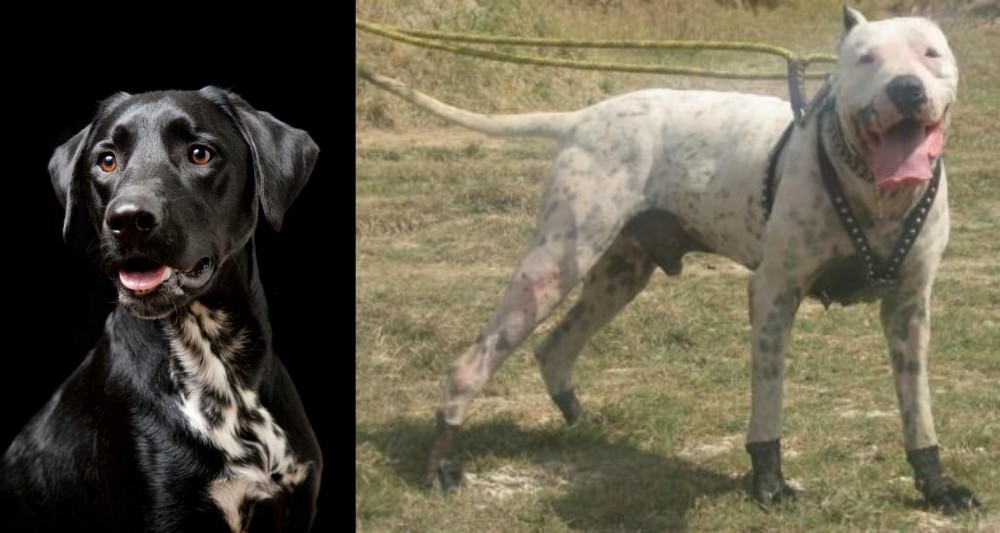 Dalmador is originated from United States but Gull Dong is originated from Pakistan. Dalmador may grow 48 cm / 18 inches shorter than Gull Dong. Dalmador may weigh 31 kg / 68 pounds lesser than Gull Dong. Both Dalmador and Gull Dong has almost same life span. Both Dalmador and Gull Dong has same litter size. Dalmador requires Moderate Maintenance. But Gull Dong requires Low Maintenance
Dalmador is originated from United States but Gull Dong is originated from Pakistan. Dalmador may grow 48 cm / 18 inches shorter than Gull Dong. Dalmador may weigh 31 kg / 68 pounds lesser than Gull Dong. Both Dalmador and Gull Dong has almost same life span. Both Dalmador and Gull Dong has same litter size. Dalmador requires Moderate Maintenance. But Gull Dong requires Low Maintenance
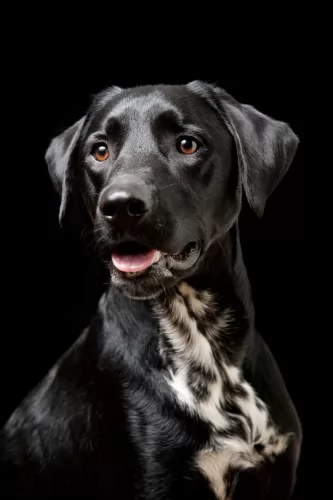 The Dalmador is a cross-breed – a mix between a Dalmation and a Labrador, and because it is a a fairly new breed you won’t find much information about the dog’s origins.
The Dalmador is a cross-breed – a mix between a Dalmation and a Labrador, and because it is a a fairly new breed you won’t find much information about the dog’s origins.
We do know that the Labrador originated in Canada and that the Dalmation comes from Croatia. Both these dog breeds have their own interesting histories. The Dalmador is a hybrid dog and isn’t a member of the American Kennel Club.
They started coming about from the 1980s when mixing one pure-breed dog with another became popular.
 The Gull Dong dog is thought to come from British Colonial India during the 1900's. The area later became known as Pakistan, and this is where the dog originated from.
The Gull Dong dog is thought to come from British Colonial India during the 1900's. The area later became known as Pakistan, and this is where the dog originated from.
Known also as the Bully Gull Terr, the dog came about by crossing Bully Kutta (Pakistani Mastiff) with a pure bred Gull Terr. The breeders wanted a dog that had the best features and characteristics of both the 2 dog breeds.
They were looking for particular characteristics such as size, strength and speed. This is a rare dog breed and he isn’t associated with any kennels or clubs, so not many records have been kept regarding their origin and development.
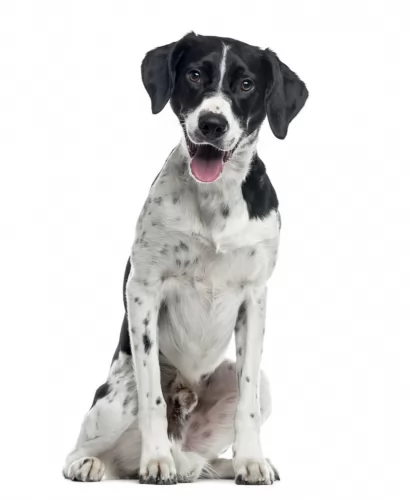 The Dalmador is a cross breed dog which comes from crossing the Labrador Retriever with a Dalmatian. The result is a muscular, well proportioned body.He has floppy ears and a long tail.
The Dalmador is a cross breed dog which comes from crossing the Labrador Retriever with a Dalmatian. The result is a muscular, well proportioned body.He has floppy ears and a long tail.
He is medium to large sized dog and can stand up to 58cm in height and weigh between 25 and 32kg. No two dogs look the same and some dogs gravitate more towards the one breed while others toward the other.
Most Dalmadors have the spotted coat, although the coat could have very visible spots or maybe just a few dots on the fur. Then again there are some Dalmadors where the coat is more of a solid color in brown or black or cream with some white patches. The double coat is short and dense and he is quite a heavy shedder.
The Dalmador is a gentle, friendly dog, making him a great family pet. You can’t really say exactly what temperament your Dalmador will have as he could inherit either the Dalmatian’s more aloof nature or he could inherit the friendly character of the Labrador.
He is quite likely to be even-tempered and is amicable with other pets in the home. He is alert too and this makes him a good watchdog. Because the Dalmador is the hybrid of two active, alert, intelligent breeds you can expect a dog which for some will be quite a handful. It is why training and socialization can be excellent for the Dalmador as it will calm him down, turning him into an obedient dog who comes and sits when told.
If you’re looking for an energetic, active and highly social dog, the Dalmador will suit an active family that can join in with all his high jinks.
 The deep chested Gull Dong is a large dog and stands at 76 – 106cm in height and weighs in the region of 40 – 63kg.
The deep chested Gull Dong is a large dog and stands at 76 – 106cm in height and weighs in the region of 40 – 63kg.
He has a short, smooth coat in various colors such as white, grey, black, brindle or bi-color such as white with black spots. He is a muscular, powerful breed dog and his ears are mostly cropped, but when left they are short and floppy. His tail can be docked but these days it tends to be left long. He has a huge head, and similar to bulldogs, this mastiff dog has loose skin around the jaw and neck.
This is a strong-willed dog who is also intelligent. Just his sheer size will require that you have him trained and socialized. It is actually important to train and discipline this dog as he is strong willed. He is intelligent and learns easily.
After training, he will require a strong, firm and consistent owner. He is fairly suspicious of strangers and won't take kindly to anyone who tries to come onto his properly. He is a dominant, aggressive dog and while he is a loyal, loving pet with his human family, he isn't an ideal dog to have with small children in the home.
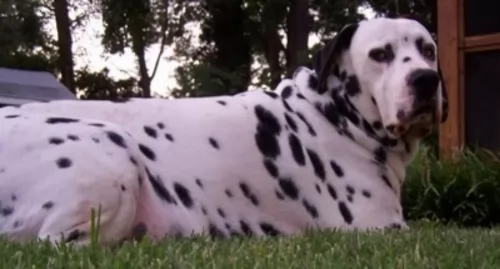 The wonderful Dalmador is such a easy-going, cheerful dog full of surprises really, as you never know which dominant traits he will inherit from either of the two dogs involved in his making.
The wonderful Dalmador is such a easy-going, cheerful dog full of surprises really, as you never know which dominant traits he will inherit from either of the two dogs involved in his making.
Friendly and social, he loves his human family and is totally loyal and loving toward them. Even tempered and faithful, if you’re looking for a wonderful 4-legged friend and companion, the Dalmador promises to make you a splendid pet.
 This is a powerful, intelligent dog and with training and socialization he is capable of becoming a loving, protective pet who listens to you.
This is a powerful, intelligent dog and with training and socialization he is capable of becoming a loving, protective pet who listens to you.
He does tend to be aggressive and therefore people who are buying a dog for the first time might battle with the characteristics of this dog. He will certainly need a firm, strong, patient owner. He isn't the wisest choice for when you've got small children in the house, though well trained dogs and children are able to get along well together.
When your heavy, muscular Gull Dong is handled in a firm, kind manner, he is well exercised and fed and treated firmly and kindly, he is able to make a great, loyal companion.
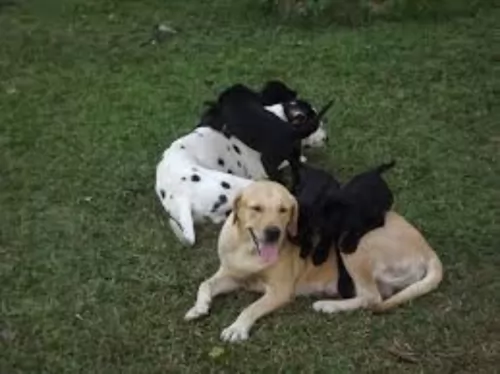 The Dalmador is a hybrid dog and they don’t experience the same health issues that the pure bred dog contends with. The Dalmador has a life expectancy of 10 to 14 years and he can reach this age if you give him all the doggy care he deserves as a 4-legged member of your family.
The Dalmador is a hybrid dog and they don’t experience the same health issues that the pure bred dog contends with. The Dalmador has a life expectancy of 10 to 14 years and he can reach this age if you give him all the doggy care he deserves as a 4-legged member of your family.
Apart from a common dog ailment – hip dysplasia, bloat and obesity are also common problems for your dog.
Bloat is a serious health condition that can actually be fatal because its a twisted stomach where trapped gas puts pressure on the diaphragm.
You will notice the swollen stomach of your pet. Larger breeds are more prone to suffer from bloat because of being deep-chested. Also known as gastric dilatation-volvulus, a vet will need to intervene with this ailment as it can be life-threatening.
 The Gull is a fairly healthy dog, and with good care he can reach 10, 11 or 12 years of age.
The Gull is a fairly healthy dog, and with good care he can reach 10, 11 or 12 years of age.
If you choose to own a white one, you will know that he is susceptible to deafness and skin problems. White coated dogs battle with deafness, and the reason for this is that they carry the piebald gene. The piebald gene is a result of the absence of melanocytes – those cells which create pigment.
The ability to hear comes from a layer of cells within the inner ear which come from the same stem cell source. Without this stem cell, the dog isn't able to make this specialized layer of hearing cells.
With hip dysplasia, the head of the thigh bone doesn’t fit properly into the hip socket, resulting in the bone wearing away and arthritis settling in. Your dog can experience pain and stiffness and he can become lame. You'll notice he is no longer enthusiastic to join in with games and exercise.
Hip dysplasia can be managed with medication while some dog owners, if they can afford it, turn to surgery which can be very costly.
He is a deep chested dog and this means you need to be aware of the risks associated with bloat, an emergency gastrointestinal syndrome which can be life threatening and where your dogs stomach becomes hard and bloated.
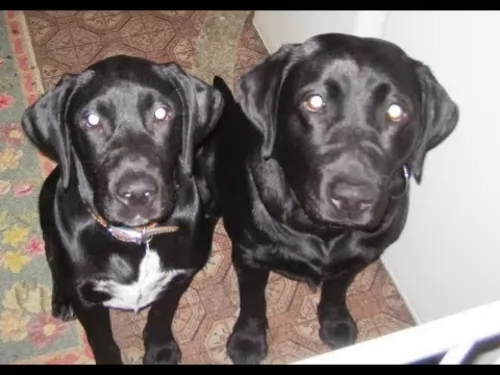 The Dalmador is a medium to large dog so you want to be feeding him one or two bowls of food a day. You want to be giving your Dalmador top-quality food to ensure good health. The lower quality foods are inclined to have ingredients in them that aren’t good for your pet.
The Dalmador is a medium to large dog so you want to be feeding him one or two bowls of food a day. You want to be giving your Dalmador top-quality food to ensure good health. The lower quality foods are inclined to have ingredients in them that aren’t good for your pet.
Always try to include some home-made food into your pet’s diet such as cooked brown rice, cooked chicken and vegetables. You can mix this into some of his dry kibble. It is important to include some raw meat into his diet from time to time as well.
Clean water must be constantly available. Without good quality food and water, you jeopardize the health of your pet.
He isn’t going to require much maintenance so a good brush twice a week will rid him of loose hairs and keep his coat shiny and glossy.
Other things to check regularly are his ears and to brush his teeth 2 or 3 times a week. Don’t neglect giving him a good amount of exercise too.
 Plenty of room to run around in is important for the Gull Dong as he is a working breed who is used to having a job to do. You will certainly need to take him on walks or play rope- and ball games with him.
Plenty of room to run around in is important for the Gull Dong as he is a working breed who is used to having a job to do. You will certainly need to take him on walks or play rope- and ball games with him.
The Gull will require brushing twice a week as he is a short haired dog and an average shedder.
This is a large energetic dog and you will need to feed him a high quality food specially for large, energetic dogs. He needs his full quota of minerals and vitamins in his food. Provide him with homemade food such as cooked chicken, rice and vegetables and some raw meat from time to time. Never leave him without a constant supply of fresh, cool drinking water.